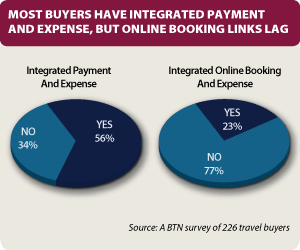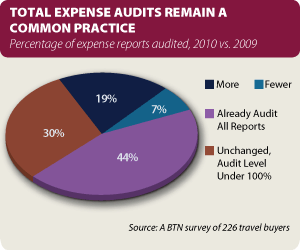Most expense managers have integrated their payment and
expense reporting systems, though integrating expense with online booking
remains less of a priority, according to the 7th annual Business Travel News Expense Manager Survey.
For the first time in the survey's history, more than half
of the 226 expense manager respondents indicated that their payment tools are
integrated with their expense reporting systems. An additional 10 percent said
they planned to integrate the two within the next year, leaving only one-third
saying they have no plans to integrate.
"The entire point of expense management is to reimburse
card providers, so automation in that area is an extremely widely adopted
service component," said Mike Hilton, expense management supplier Concur's
executive vice president of worldwide marketing. "There are some companies
that choose to reimburse through other mechanisms, such as payroll, but that's
not a best practice."

Just under one-quarter of respondents said they have
integrated their online booking tools with their expense reporting systems.
Rick Wakida, global travel manager for Sunnyvale, Calif.-based network
management company Blue Coat Systems, said that lower number reflects a matter
of priorities.
"Integrating payment and expense provides greater
value, because payment is actual charges that need to be reimbursed,"
Wakida said. "There's not as much value in having booked transactions flow
through to expense reports, especially if you had to pick, and I'm not so sure
that a lot of companies have the luxury to do both."
Expense management supplier Databasics CEO Alan Tyson said
he did not see a large demand for online booking and expense integration.
"A lot of [travelers] don't want to bring that
information over and do a proto-expense report, because it becomes extremely
confusing to try to reconcile it," he said. "You have to enrich it
anyway, so it's just as easy to drop down the transaction from the corporate
card."
Booking and expense integration was the cornerstone of
Concur's 2006 acquisition of Outtask and its online booking tool Cliqbook, and
the company since has integrated the two into a single tool, though it still
offers them separately as stand-alone tools as well. Other expense management
providers fulfill integration requests through partnerships with booking tool
providers.
The 23 percent of survey respondents who indicated booking
and expense integration at their organizations represented progress from the 12
percent who reported such development in BTN's 2007 survey.
"When we acquired Outtask, integrated travel and
expense management was just a concept," Hilton said. "No one had
really done it before, and there was a lot of skepticism in the industry. To
see this just four and a half years later, from my perspective, is a great
adoption curve."
During a National Business Travel Association educational
session on integrated travel and expense, Carolyn Hardee, manager of travel
operations and technology for design software supplier Autodesk, said her
company in recent years in about 20 countries moved from a manual, Excel-based
expense reporting process to integrated expense reporting. She saw the
installation as a benefit to employees who bear responsibility for paying the
balances on their own corporate cards.
"If they're working on a trip, they'll also start
creating their expense report, and they'll get their money back faster as well,"
Hardee said. "This was about hopefully making the employee happy."
Similarly, Tim Bone, director of union conventions, events,
meetings and travel for the Service Employees International Union, said his
organization in a relatively short time has moved from largely manual processes
to integrated booking and expense. When he joined the organization in 2007, it
had no centralized travel agency or online booking tool, but now reports a 98
percent adoption level on Cliqbook, which integrates with its expense
management tool.
The integrated expense system allows Bone to communicate to
his superiors the return on investment of the travel program, he said.
Previously, data was difficult to track because SEIU still does not have a
travel and entertainment card for its travelers, relying instead on ghost cards
for airlines and direct billing for hotels.
"We survive on membership dues, so we have to show what
they are getting out of their dues," Bone said. "I'm able to pump the
information; I'm able to filter out back into the organization."
SEIU now is trying to move away from ghost cards and toward
a corporate card program, he said.
Concur's Hilton said part of the lag in expense/booking
integration stems from the multiyear agreements with online booking providers
that some companies have. A majority of Concur's new clients choose the
integrated booking and expense tool, he added.
Craig Fearon, senior product director for expense
applications at expense management supplier CyberShift, said expense managers
always have to evaluate whether it would be beneficial for their companies to
integrate the two. "The adoption numbers may increase somewhat, but they're
two fairly separate functions," he said. "For some organizations, the
integration makes sense. For others, it doesn't."
Business Travel News'
survey also indicated that some companies are tightening their audit policies
this year. Nineteen percent said they are auditing more reports this year
compared with 2009, while only 7 percent said they were auditing fewer.
 However, 44 percent said they already have been auditing 100
percent of their expense reports, compared with the 41 percent from last year's
survey who said 100 percent audits was their organizations' practice.
However, 44 percent said they already have been auditing 100
percent of their expense reports, compared with the 41 percent from last year's
survey who said 100 percent audits was their organizations' practice.
Depending on the size of the company, auditing every expense
report is not necessarily a best practice. Databasics' Tyson said his company
recommends a minimum audit level of 20 percent. Many companies do a combination
of auditing all expense reports flagged as out-of-policy by automated tools, "cowboy
audits" of the their top spenders and random audits.
While 100 percent audits are feasible for small companies,
they can be counterproductive for larger companies, according to Blue Coat's
Wakida.
"If you're auditing more expense reports, you have to
increase your employees' workload or hire resources," he said. "Is
that paying for itself? Or is it costing more than it returns?"
Some midsize and large companies maintain a 100 percent
audit rate because that was the policy when they first started and they are
reluctant to imply to travelers that they are relaxing the rules, Wakida said.
Auditing levels also vary by industry. Some sectors, such as
the pharmaceutical industry, face tighter government regulations on their
expense policies.
CyberShift's Fearon said even the best automated expense
reporting tool cannot prevent employees from doctoring receipts and committing
fraud. CyberShift launched an outsourced auditing service earlier this year, and
Fearon said there's been steady interest. Outsourced auditing carries the
benefits of neutrality, while in-house audits may be performed by junior
employees who might overlook problems with senior employees' expense reports
out of fear for the jobs, he said.
"Outsourced auditors won't really even look at names,"
Fearon said, "whether it's the CFO or just Joe Blow."
This report appears in
the Nov. 8 issue of Business Travel News.